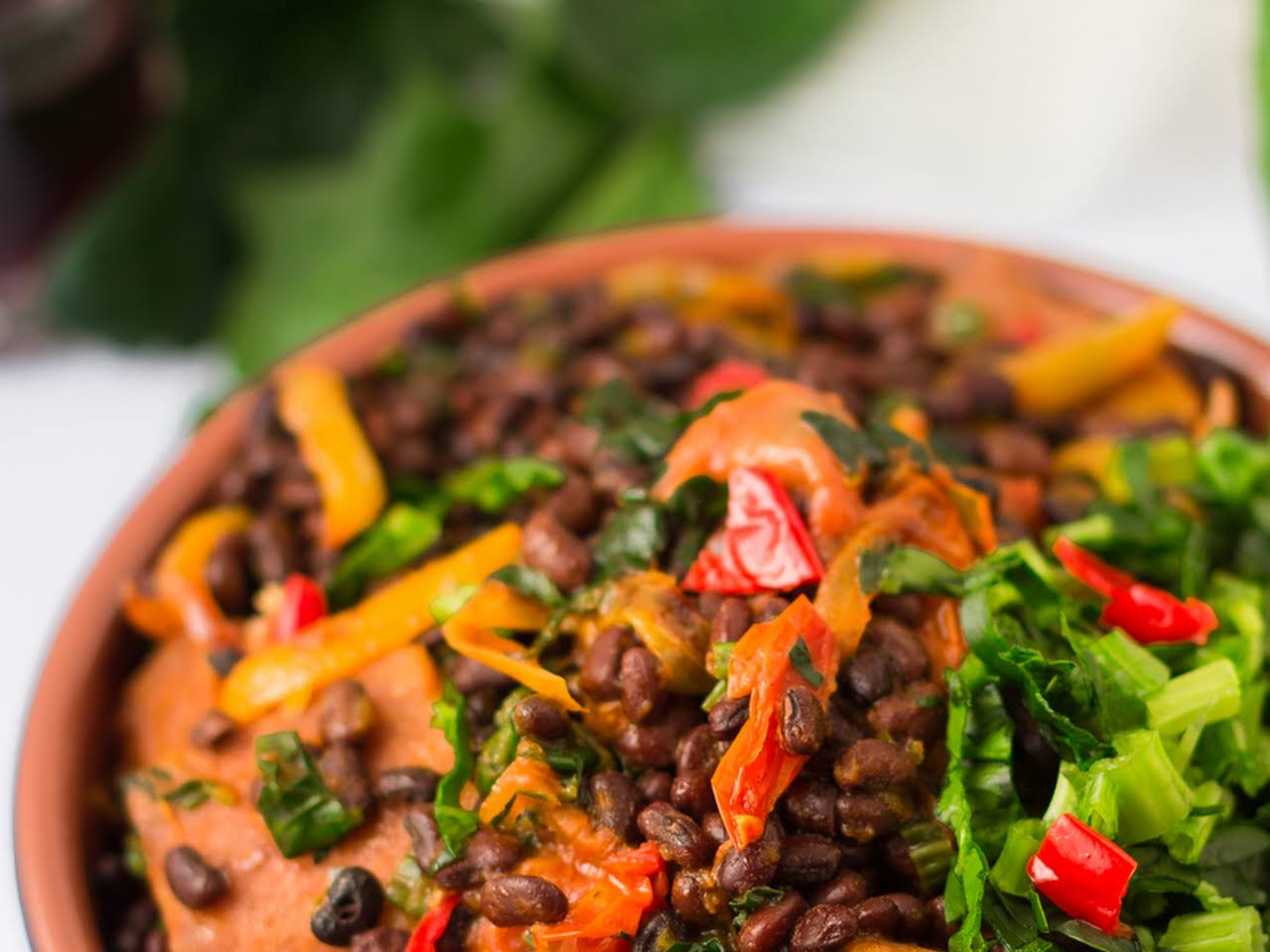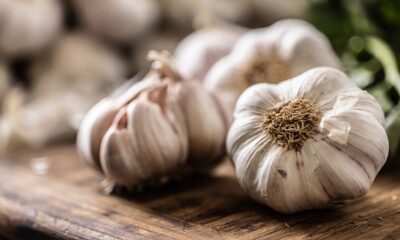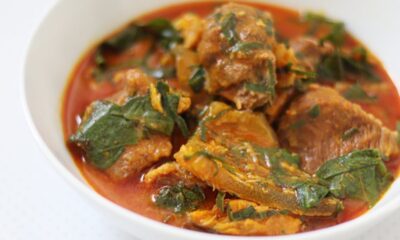FOOD
All You Should Know Before Skipping Breakfast
Published
2 years agoon
By
wpadminee
Skipping breakfast is a common practice, with up to 25% of adults regularly skipping the meal. While it is often believed that breakfast is the most important meal of the day, there is increasing evidence to suggest that skipping breakfast may actually have some health benefits.
These health benefits are numerous and should be taken seriously if you want them effective for you. This is not to say that you should starve yourself or deprive yourself of healthy morning food. It just means that skipping breakfast sometimes can be beneficial for your health.

What are the benefits of skipping breakfast?
1. Weight loss:
Skipping breakfast can help you reduce your calorie intake for the day, which can lead to weight loss. A study found that people who skipped breakfast lost more weight over a 16-week period than those who ate breakfast. So, if you are among those trying to loose weight or burn down calories, you should consider skipping breakfast sometimes.
2. Improved blood sugar control:
Skipping breakfast can help to lower blood sugar levels and improve insulin sensitivity. This may be beneficial for people with type 2 diabetes or prediabetes. It has been discovered that people with type 2 diabetes who skipped breakfast had lower blood sugar levels throughout the day than those who ate breakfast.
3. Increased growth hormone levels:
Growth hormone is a hormone that helps to build and repair muscle tissue. Skipping breakfast can lead to an increase in growth hormone levels, which may be beneficial for people who are trying to build muscle mass or lose weight.
You wonder how this is possible when you think you need food to build the body and body tissues, right? Growth hormones do not necessarily need food especially when they can get whatever nutrients they need from the body reservoir.
4. Improved cognitive function:
Skipping breakfast can improve cognitive function, such as memory and attention. Sometimes eating in the morning makes you very dull through the day especially when it is a heavy meal. So when you skip breakfast, your body becomes more aware of what is happening and coordinates better.
5. More time to sleep:
This is for the leisure and relaxation folks. You find that the time you would use in making breakfast can buy you sleep if you skip that breakfast. Thank me later. Skipping breakfast can give you more time to sleep in the morning. If you are short on time, it may be a good way to get a few extra minutes of sleep or whatever.
We have talked about what not eating breakfast sometimes can do to us positively. What about what it does to us when we indulge too much or excessively? While we should skip breakfast sometimes, it is highly advised that it should not come off as a habit because it has its side effects.

What are the side effects of not eating breakfast regularly?
Do you skip breakfast for any of the reasons stated above? We all have our reasons for forgoing breakfast in the morning. However, keep in mind the things you are about to read below just as a guide to not overdo it.
1. Deficiency of vital nutrients:
Skipping breakfast means missing out on essential nutrients like fibre and vitamins that are crucial for sustaining your energy throughout the day. Consistently skipping breakfast can lead to inadequate intake of these nutrients, potentially leading to long-term health issues.
2. Adverse effects on energy levels and mood:
If you’ve been making a habit of skipping breakfast daily and have noticed increased irritability and decreased energy levels, your breakfast-skipping habit could be to blame. In other words, the side effects of breakfast omission can manifest as reduced energy levels and mood swings. So, the next time you find yourself feeling fatigued and irritable without an obvious cause, consider whether you’ve had breakfast.
3. Impacts on cognitive functioning:
Regular breakfast consumption has a positive influence on cognitive functioning. While it is true that skipping breakfast could help you perform better cognitively because it makes you more aware, scientific research has shown that individuals who skip breakfast on a regular basis exhibit worse cognitive performance compared to those who just skip sometimes.
4. Slowing down of metabolism:
Can you function without food indefinitely? Certainly not. Food provides the energy necessary to sustain us throughout the day. Consequently, if you neglect to nourish your body with breakfast, the first meal of the day, your body’s functioning may be compromised.
5. Encourages unhealthy cravings:
Skipping breakfast means your body hasn’t received any energy or nutrients since your last meal, which could have been 12 to 14 hours ago. Worse still, this can lead to poor dietary choices later in the day. Who can resist the allure of doughnuts when hunger strikes? Even if you’re not particularly fond of breakfast, your organs require it to function effectively. Breakfast, whether it’s a quick bowl of oatmeal or a hard-boiled egg, provides essential nutrients early in the day and helps maintain steady blood sugar levels. So with this, do not skip breakfast on a regular basis.
6. Skipping breakfast can trigger migraines:

One of the potential consequences of forgoing breakfast regularly is an increased susceptibility to migraines, particularly if you are already prone to them, probably because you have gotten used to not eating in the morning. Skipping your morning meal regularly can lead to low blood sugar levels, which may elevate blood pressure and raise the likelihood of experiencing a migraine attack. This is why it is advised to skip breakfast sometimes, not regularly.
7. Weakened immune system:
When you skip breakfast on a daily basis, your immune system can be compromised. This is because breakfast omission can adversely affect your immune cells. The body relies on consistent nutrition to maintain a healthy supply of immune cells capable of combating illnesses and enhancing the function of T-cells.
Having gone through the benefits and side effects of skipping breakfast, you should consider what to eat on the days you decide to eat breakfast. This will help your balance the equation.
What should I eat for breakfast?
The list of healthy foods to be eaten as breakfast goes on and on as it is endless, but let us see a few of them below:
- Eggs
- Greek yoghurt
- Oat meal
- Fruits
- Cheese
- Tea
- Nuts
- Protein shakes
- Smoothies
Any of these foods eaten as breakfast is good for your health, but be mindful not to overeat or indulge all the time.

It is also needful to listen to your body and eat breakfast if you are hungry. But, if you are not hungry in the morning, there is no need to force yourself to eat.
To be sure that you are on the right track when skipping a breakfast, check out these tips below:
- Make sure you are getting enough sleep the night prior.
- Drink plenty of water throughout the day.
- Eat healthy snacks throughout the day, such as fruits, vegetables, and nuts.
- Avoid sugary drinks and processed foods.
- If you are taking any medications, please and please again, do not skip breakfast. If you must, talk to your physician first.
What are your final thoughts?
The bottom line is that eating a healthy breakfast is essential to living a healthy life. Skipping breakfast sometimes is very good to the body, but… Not when you do it regularly or on a daily basis. If you do it daily, the side effects will put you at the risk of many health concerns.
So, go for a breakfast that is full of nutrients and DON’T SKIP IT REGULARLY!
After the knowledge you just got, you definitely want to check out more of our articles on health. Check here.
You may like
FOOD
4 Tips For A Stress-Free Cooking Experience This Christmas
Published
3 months agoon
December 22, 2024By
wpadminee
The Christmas season is a time for joy, family, and delicious meals. However, cooking can often feel overwhelming, especially with the holiday hustle. With the right approach, cooking Christmas meals can be a stress-free experience.
Here are four practical tips for a stress-free cooking experience this Christmas.
1. Plan Ahead for Every Detail
Preparation is the key to success in the kitchen. Start by creating a detailed menu. Write down the dishes you want to make, the ingredients you need, and the estimated time for each recipe. This planning ensures you stay organised.
Invest time in grocery shopping early. Stores can be crowded closer to Christmas, so getting what you need in advance helps avoid the rush.
Batch-process tasks like peeling vegetables or marinating meat a day or two before. Following these tips for stress-free cooking keeps last-minute chaos at bay.
2. Simplify Your Menu
Christmas meals don’t need to be extravagant to be memorable. Focus on a few key dishes that everyone loves rather than a spread that leaves you exhausted. Choose recipes that are easy to prepare and don’t require constant attention.
For desserts, consider make-ahead options like pies or cookies. These can be prepared in advance, allowing you to spend more time with your guests. Simplifying your menu is one of the best tips for stress-free cooking this Christmas.
3. Use Time-Saving Tools and Techniques
Modern kitchen gadgets are lifesavers during Christmas. Slow cookers, food processors, and stand mixers can help speed up the process while reducing effort.
For large meals, use your oven efficiently. Bake multiple dishes at once if they require the same temperature. Pre-chop ingredients or buy pre-cut options to save valuable time.
Embrace these tips for stress-free cooking to make your holiday meal prep smoother and faster.
4. Delegate and Involve Others
You don’t have to do everything yourself. Share the workload with family or friends. Assign simple tasks like setting the table, washing vegetables, or stirring sauces to others.
If guests offer to bring a dish, accept their help. Potluck-style dinners reduce your cooking burden while adding variety to the table.
Delegating responsibilities is among the most effective tips for stress-free cooking, ensuring you enjoy the process too.
Cooking for Christmas doesn’t have to be a source of stress. By planning ahead, simplifying your menu, using time-saving techniques, and involving others, you can create a joyful and memorable meal.
These four tips for stress-free cooking will not only lighten your load but also let you focus on the true spirit of the season: togetherness and gratitude.
Keep these strategies in mind as you prepare your holiday feast. Merry Christmas and happy cooking!
For more reads, visit here.
FOOD
3 Delicious Recipes For Making Akidi (Black Beans)
Published
4 months agoon
December 8, 2024By
wpadminee
Akidi (black beans) recipes are a cornerstone of Enugu State’s culinary heritage, enjoyed widely across Nigeria and Africa. This versatile legume, rich in protein, fibre, and essential vitamins, makes it a nutritious staple in many homes.
Originating from Enugu, akidi holds a special place in traditional dishes, offering robust flavour and health benefits.
If you’re looking to expand your cooking repertoire, these three delicious akidi (black beans) recipes will elevate your meals.
Whether you’re an experienced chef or a kitchen novice, each akidi (black beans) recipe provides a unique taste experience.
Embrace the richness of Enugu’s culture and impress your family with these flavourful and nutritious dishes featuring the beloved black beans.
Recipe 1: Classic Akidi Soup
Ingredients:
- 1 cup dried black beans (akidi)
- 1 large onion, chopped
- 2 scotch bonnet peppers, chopped
- 2 tablespoons palm oil
- 1 teaspoon dried crayfish
- 1 teaspoon salt
- 1/2 teaspoon black pepper
- 1 stock cube
- Water
Instructions:
- Soak the beans: Rinse the black beans and soak them in water overnight.
- Cook the beans: Drain the soaked beans and add them to a pot with fresh water. Bring to a boil, then reduce heat and simmer until the beans are tender.
- Sauté the aromatics: Heat the palm oil in a separate pot. Add the chopped onion and scotch bonnet peppers, and sauté until fragrant.
- Combine the ingredients: Add the sautéed ingredients to the pot of cooked beans. Stir in the dried crayfish, salt, black pepper, and stock cube.
- Simmer and serve: Simmer the soup for an additional 10-15 minutes, or until the flavours are well combined. Serve hot.
Recipe 2: Akidi with Spinach and Plantain

Ingredients:
- 1 cup cooked black beans (akidi)
- 1 bunch spinach, chopped
- 2 ripe plantains, sliced
- 1 onion, chopped
- 2 cloves garlic, minced
- 1 teaspoon ginger, grated
- 1 teaspoon curry powder
- 1/2 teaspoon turmeric powder
- Salt to taste
- Vegetable oil
Instructions:
- Heat the vegetable oil in a pot. Add the onion, garlic, and ginger, and sauté until fragrant.
- Add the spinach: Add the chopped spinach to the pot and stir until wilted.
- Combine the ingredients: Add the cooked black beans, curry powder, and turmeric powder to the pot. Stir to combine.
- Fry the plantains: In a separate pan, fry the plantain slices until golden brown.
- Serve: Serve the akidi and spinach mixture with the fried plantains.
Recipe 3: Akidi with Smoked Fish and Vegetables

Ingredients:
- 1 cup cooked black beans (akidi)
- 1 smoked fish, crumbled
- 1 large onion, chopped
- 2 carrots, diced
- 1 green bell pepper, diced
- 1 teaspoon thyme
- 1/2 teaspoon black pepper
- Salt to taste
- Vegetable oil
Instructions:
- Heat the vegetable oil in a pot. Add the onion, carrots, and bell pepper, and sauté until softened.
- Add the beans and smoked fish: Add the cooked black beans and crumbled smoked fish to the pot. Stir to combine.
- Season and simmer: Season with thyme, black pepper, and salt. Simmer for 10-15 minutes, or until the flavours are well-combined.
- Serve: Serve the akidi with smoked fish and vegetables hot with rice, yam, or bread.
These three akidi (black beans) recipes are just a starting point. Feel free to experiment with different ingredients and flavours to create your own unique dishes.
Remember, the key to a delicious akidi dish is to use high-quality ingredients and to cook slowly to allow the flavours to develop.
Whether you’re a seasoned cook or a novice in the kitchen, these akidi (black beans) recipes are a great way to enjoy this nutritious and flavourful legume.
For more articles on food recipes, visit here.
FOOD
5 Health Benefits Of Cooking With Garlic
Published
4 months agoon
December 7, 2024By
wpadminee
Garlic is more than just a flavour enhancer; it offers numerous health benefits that have been celebrated for centuries. Incorporating garlic into your meals not only enriches the taste but also boosts your overall well-being.
Let’s explore five key health benefits of garlic, emphasising why this simple ingredient deserves a spot in your kitchen.
1. Boosts Heart Health
Garlic is renowned for its heart-protective properties. It helps lower blood pressure and reduces cholesterol levels, which are crucial factors in maintaining cardiovascular health.
Allicin, a compound found in garlic, relaxes blood vessels, improving blood flow and reducing the risk of heart disease.
Regular consumption of garlic may also prevent artery hardening, a condition known as atherosclerosis. Clearly, one of the primary health benefits of garlic is its contribution to a healthy heart.
2. Strengthens the Immune System
Garlic acts as a powerful immune booster. Its antibacterial, antiviral, and antifungal properties help the body fend off infections. Rich in antioxidants, garlic combats free radicals that can damage cells and contribute to illness.
Cooking with garlic regularly can support your immune system, making it more resilient against common colds and flu. This vital health benefit of garlic makes it a natural defence mechanism.
3. Improves Digestive Health
Garlic promotes healthy digestion by stimulating the production of digestive enzymes. Its antimicrobial properties can help balance gut flora, reducing harmful bacteria and promoting beneficial ones.
Additionally, garlic may reduce inflammation in the gut, alleviating symptoms of conditions like irritable bowel syndrome (IBS).
Including garlic in your diet can improve overall digestive function, emphasising another essential health benefit of garlic.
4. Enhances Bone Health
Surprisingly, garlic may also support strong bones. It contains minerals like calcium, manganese, and selenium, which are vital for bone density and strength.
Some studies suggest that garlic consumption can increase estrogen levels in women, potentially reducing the risk of osteoporosis.
This lesser-known health benefit of garlic highlights its role beyond the kitchen, contributing to long-term skeletal health.
5. Supports Detoxification
Garlic aids the body’s natural detoxification process by activating liver enzymes that help eliminate toxins. Its sulfur compounds enhance liver function, enabling the body to flush out heavy metals and harmful substances more efficiently.
Regularly cooking with garlic can provide a natural cleanse, supporting overall vitality. This detoxifying health benefit of garlic underscores its importance for maintaining internal balance.
Incorporating Garlic into Your Diet
Maximise these health benefits by adding garlic to soups, stir-fries, and sauces. Crush or chop it and let it sit for a few minutes before cooking to enhance its beneficial compounds.
Remember, the health benefits of garlic are most potent when it’s used fresh and minimally cooked.
Cooking with garlic not only elevates your culinary creations but also offers significant health advantages. Embrace this versatile ingredient and enjoy the multiple health benefits of garlic with every meal.
Would you like more articles or additional tips? Check here.
Latest


Samsung Galaxy S25 Series Sets The Standard Of AI Phones As A True AI Companion
Samsung Galaxy S25 series sets the standard of AI phones as a true AI companion …Pioneering the multimodal era with...


5 Things To Expect In Afrobeats In 2025
Afrobeats is poised to reach unprecedented heights in 2025 as Nigerian music continues its remarkable global ascent. The genre’s explosive...


Here Are The 7 Most Ancient Countries On Earth
The oldest countries in the world stand as remarkable testaments to human civilisation, each containing landscapes and monuments that narrate...


Why Self-Reflection Is More Important Than Resolutions
Millions of people embark on a yearly ritual: they sit down with a notebook and pen, eager to craft a...


Nollywood Director, Kemi Adetiba Teases King Of Boys 3
Nollywood director Kemi Adetiba has revealed that another instalment of King of Boys will be released on December 25, 2025....


John McEnroe Says He Can Be The Commissioner Tennis Needs Amid Doping Crisis
Recent doping controversies involving top players have not damaged tennis’s reputation, but John McEnroe believes that appointing a single commissioner...


“Everybody Loves Jenifa” Becomes Nollywood’s Highest-Grossing Film Of All Time
Nollywood filmmaker Funke Akindele has achieved a historic milestone with her latest film, “Everybody Loves Jenifa.” The film has officially...


FG To Premiere TV Series, “Hidden Riches” On Mining Sector On January 25
Nigeria’s Federal Government will launch an ambitious television drama series focused on the nation’s mining sector, premiering “Hidden Riches” on...


Qing Madi Delivers A Soulful Performance Of “Favourite Pyscho”
Rising Afro-RnB sensation Qing Madi launches into 2025 with a mesmerising performance on the prestigious COLOURS platform, showcasing her latest...


Taiwo Awoniyi’s First Goal Of The Season Seals Nottingham Forest’s Win Over Wolves
Taiwo Awoniyi made a triumphant return to Premier League action. He scored in stoppage time to help Nottingham Forest crush...
-Ad-

















